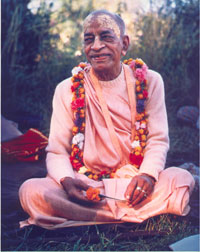BHAKTA HANDBOOK

Dedicated to His Divine
Grace A.C. Bhaktivedanta Swami Prabhupada
Welcome to the Internet Bhakta
Program. Are you new to Krishna consciousness? Would you like
to know what life is like in Krishna's temples? Would you like
to learn how to worship Krishna in your own home? We have created
this online bhakta handbook to help you progress in your spiritual
life - just read each of the chapters and you'll be on your way to making your life Krsna conscious!
*A special thanks to the devotees who helped make this bhakta handbook possible!*
Click
here for a basic introduction
to the Hare Krishna Movement
Knowledge of the Supreme
Lord, Sri Krishna
is the King of Knowledge!
Bhagavad Gita 9.2
raja-vidya raja-guhyam
pavitram idam uttamam
pratyaksavagamam dharmyam
su-sukham kartum avyayam
raja-vidya--the king of education; raja-guhyam--the
king of confidential knowledge; pavitram--the purest;
idam--this; uttamam--transcendental; pratyaksa--directly
experienced; avagamam--understood; dharmyam--the
principle of religion; su-sukham--very happy; kartum--to
execute; avyayam--everlasting.
This knowledge is the king
of education, the most secret of all secrets. It is the purest
knowledge, and because it gives direct perception of the self
by realization, it is the perfection of religion. It is everlasting,
and it is joyfully performed.
|

